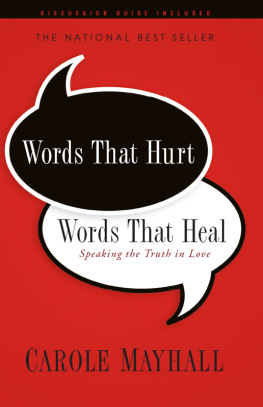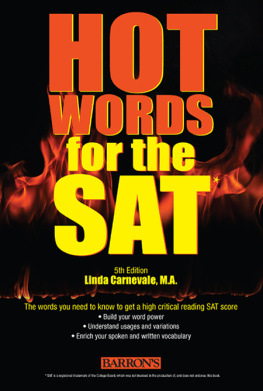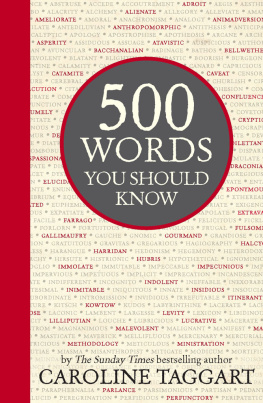All rights reserved.
Typeset in Janson by Keystone Typesetting, Inc.
Library of Congress Cataloging-in-Publication Data appear on the last printed page of this book.
A PROJECT ORGANIZED BY THE SOCIAL SCIENCE RESEARCH COUNCIL.
CAROL GLUCK
Words in Motion
As words change, the world changes. This ancient conceit turns on the power of words to make worlds, but the world, we know, also has the power to change words. Words are always in motion, and as they move across space and time, they inscribe the arcs of our past and present. This book considers the relation between words and worlds by tracing the social and political life of wordsspecific words in specific places at specific timeswith an eye to their practical and public effect. We have chosen words that do work in the world, whether organizing, mobilizing, inspiring, excluding, suppressing, or covering up. We then track these words as they cross cultural borders and become embedded in social and political practices, changing their impact and their meaning as they go. Security, indigeneity, conspiracy, minority, custom, sublimethe particular words matter less than the approach we take in pursuing them. Precisely because of their specificity, these moving words provide methodological entry into social and political experience, often leading in unexpected directions. Following a word in practiceand sticking to that word as it skittered, crawled, and leapt from one context to anotherrequired research strategies at once nimble and daunting. The more closely we pursued each word, the harder it became to rely on received language and disciplinary discourse to do our analytic work for us. The approach acted something like a lever, with a single word at one end conferring an interpretive advantage that lifted a substantial social and political weight at the other. So we began with words and ended with worlds that looked different from those we had imagined when we started. As anthropologists, sociologists, political scientists, historians, and literary scholars of, and from, different countries, what we have in common is the injunction to follow our word to where it does its work. We also share a disinclination to treat language in isolation fromor as transparently linked toits social and political context. But we are not linguists, and although most of us deal with the translation from one language, culture, and power to another, we are not engaged in translation studies either. There is some etymology and genealogy, but not much, and whatever there is of word-theory is mostly common sense. Nor can we claim more than lateral kinship with such estimable works as the now classic Keywords of Raymond Williams; its recent update, New Keywords; or the series Keywords for a Different Kind of Globalization. In fact, we found that the larger the concept, the less productive the word-following of the sort we were after. Important words like democracy, tradition, civilization, and rights traveled the globe and appeared in many local and national inflections, but they were often too abstract and discursivetoobigto take us into the sometimes less debated but more embedded practices of social life. Tracking the spoor of democracy in China, for example, would be too ambitious a goal for an exercise on words in motion of this kind. Ours is a more modest endeavor.
The endeavor of course has a history, which helps to explain why these words and these authors got together in the first place. The idea of Words in Motion arose in the aftermath of the Asian Economic Crisis of 1997, when institutions such as the International Monetary Fund (imf) and the World Bank tightened their already considerable hold on governments that did not meet the global standards that they, the rich and powerful, had enunciated for the world. Financial aid and geopolitical bona fides for countries like Thailand and Indonesia depended on their achieving transparency, the rule of law, and the rest of the neoliberal litany of the 1990s. Even as the North imposed these words on the South, words like crony capitalism traveled within the South, from the Philippines to Indonesia, Malaysia, and beyond. Meanwhile, the expanding vocabulary of globalization brought such terms as human rights, civil society, and the environment into ever increasing play around the world. Islamic words like sharia moved anew across Muslim societies; terrorism and other fear words took on expanded global meanings. How could one not be struck by the whirlwind of words in motion?
Southeast Asia provided our first words, soon to be followed by the Middle East and North Africa, East Asia, Europe, the Americas, and had we world enough and time, every other place. For we soon realized that the whoosh of fast-moving words in the 1990s was nothing new. The powerful global words that now moved from North to Southfrom developed to developinghad late-nineteenth-century counterparts in the powerful imperial words that moved from West to Eastfrom civilized to backward. If power pushed some words around, others moved by virtue of their own magnetism. Custom in Arabic, though incorporated into the colonial glossary, attracted nationalists and reformers from Indonesia to Morocco because of its capacity to create a positive space for local cultures, religious practices, and ethnicities. Words like responsibility gained immediate traction in Japan not because they were Western or imposed by the world system, but because they seemed to contain new possibilities for social, political, and moral action. Words also moved fluidly back and forth within the various regions of the world, taking and making meanings across national boundaries. They crossed social lines, too, as they rose from the chants of the powerless into the police orders of the powerful, and sometimes in the opposite direction. In this respect, words often seemed to travel light, at least at first.
Yet in nearly every instance, the initial cross-border transpositions of a word marked only the beginning of its motion. Such imported or imposed words as secularism in Morocco, terrorism in India, and good governance in Thailand subsequently cut their own course through different sectors of society and politics. As they moved, they changed in meaning and practice, at times becoming localized to the point that they no longer resembled the words they once were. Moreover, as they movedsometimes contentiously, sometimes unnoticedwithin a particular society, the words also continued their mobility elsewhere in the world, so that over time new usages looped back to join or counter old ones. There was no end to the trail of words in motion. But one volume can only hold so much, so that what we offer here is a sampling of words chosen for their concreteness, whose movement could be traced first across linguistic and cultural borders, then through social and political processes as these changed across time.
Our choice of words is not random, however, in part because it reflects the origins of the project in thinking about Asian and Middle Eastern societies at the turn of the twenty-first century. But whether our words migrated from Britain to China, Algeria to France, or the United States to Brazil, they are all global, modern, and, above all, political. And although they do not add up to a single storywhich could be summed up as the postcolonial condition, the nature of the modern state, or the effects of post-Cold War geopoliticsthey do link to one another, often in multiple, crisscrossing ways that say a lot about the worlds we live in, the tenor of modern times, and the practices and processes of contemporary politics. Had we been writing in turn-of-the-nineteenth-century revolutionary Europe or turn-of-the-twentieth-century modernizing Asia, the words and the links would have been different. Indeed, a number of our words are new, the products of modernity itself. Some became prominent because they acquired new usages, such as conspiracy and responsibility; others were neologisms created to meet present needs, which was the case with good governance in Thai and indigenous peoples in Indonesian. Prince Wan was doubtless in a class by himself as he set out single-handedly to coin official Thai words for foreign terms in the 1930s. Yet even his aristocratic zeal and status could not assure that his new words would stay put and thereby guarantee the security of the Thai nation.








